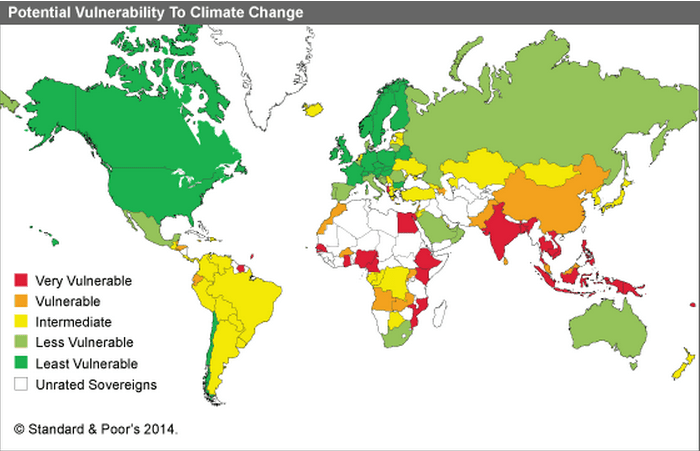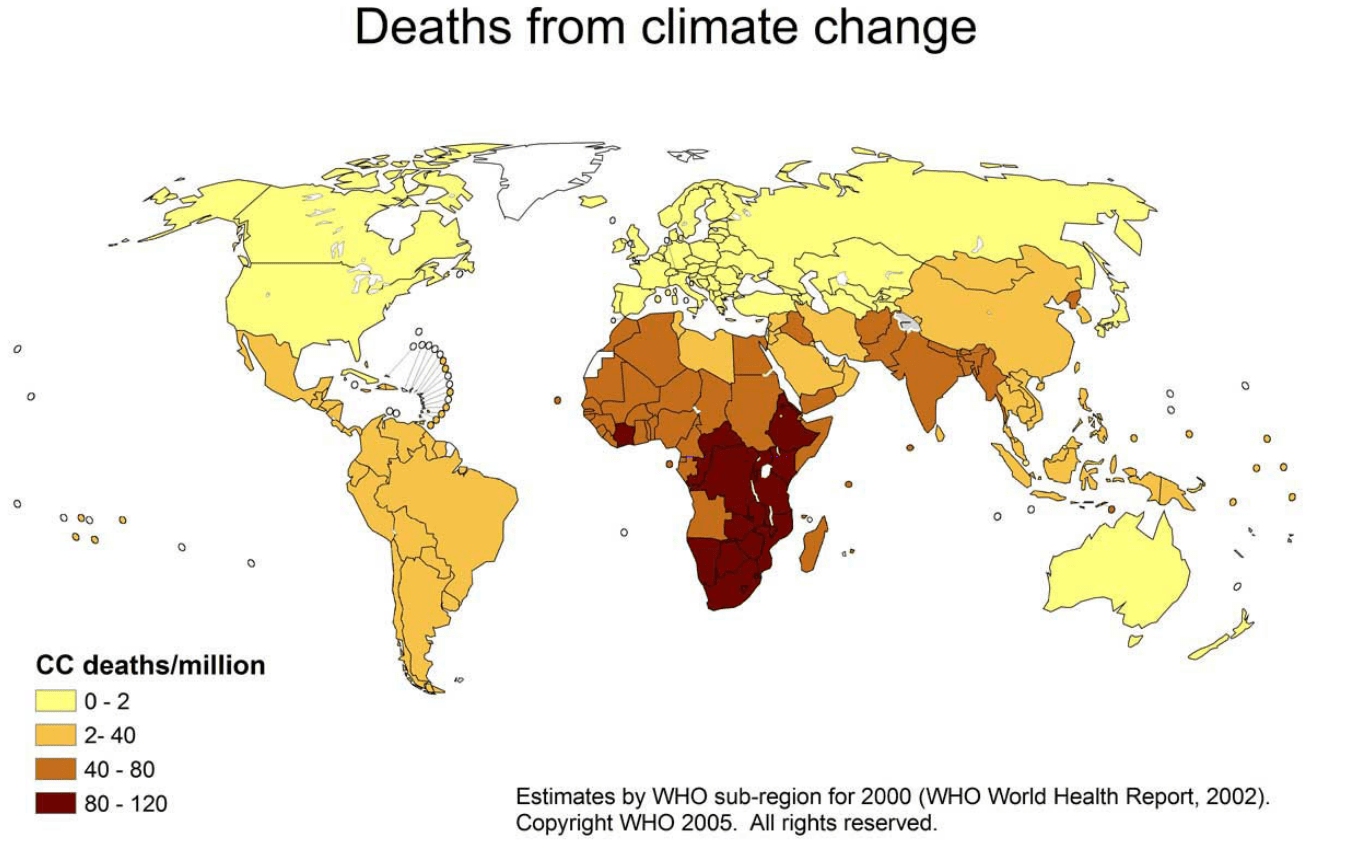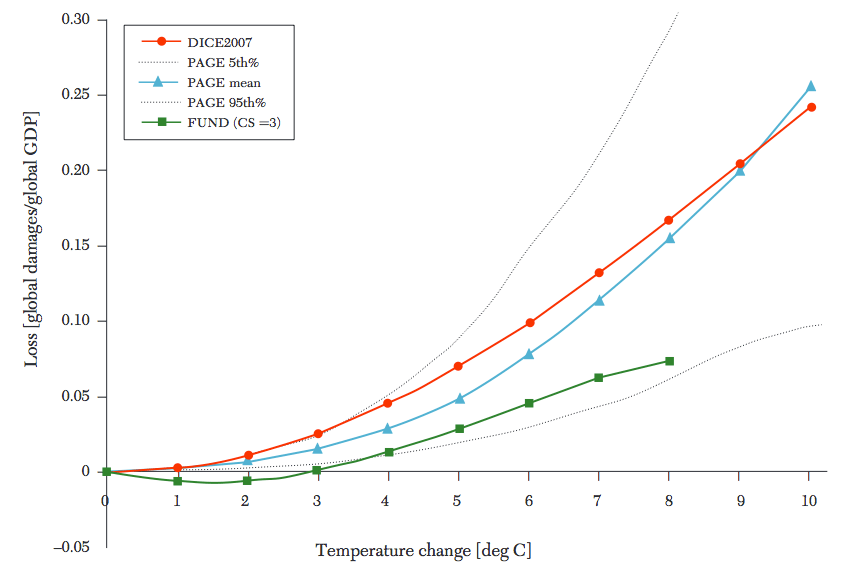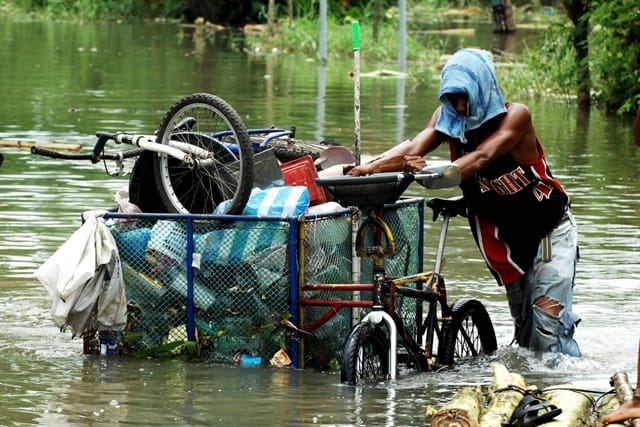Of the many lamentable consequences of global warming, perhaps the worst is represented in this map (h/t Vox):

The areas in green are least vulnerable to the effects of global warming. Those in red are the most vulnerable. Unfortunately, the areas that are most vulnerable are also inhabited by some of the poorest people in the world.
In fact, a recent report by the Copenhagen Consensus Center found that:
“Most countries benefitted from climate change until 1980, but after that the trend is negative for poor countries and positive for rich countries. The global average impact was positive in the 20th century. In the 21st century, impacts turn negative in most countries, rich and poor.”
This is not an accident. Poverty makes one vulnerable in any number of ways. Farmers who live off their own land will have nothing to eat if a drought runs longer than expected. Families with insecure homes have little protection from monsoons. Relocation from especially treacherous terrains will inevitably be most difficult for those who have the least resources.
What makes this perverse is that those of us in the developed world benefit most from the global use of fossil fuels. Wealthy nations have gotten rich on the indulgence of carbon, and this wealth will protect us from the most intense consequences of our recklessness (map h/t Vox).

All this might seem to make the case for donating to environmentalist organizations or certain policy advocacy groups. While this might be worthwhile, it can be a difficult case to make. Global warming is an extremely complex problem, and it’s not at all clear where the best solutions will come from. Worse still, there are powerful interest groups that fight any policy that seeks to regulate the biggest polluters.
However, the devastating effects of a changing climate on impoverished countries further bolster the case for global aid charities. The money spent on raising the living standards of those most at risk can mitigate some of the dangers caused by their poverty. And if we spend money fighting poverty rather than heating a second home or consuming animal products, we reduce our contribution to the rapid consumption that is overheating the planet.
An objection might be that though we reduce our personal consumption by giving away significant amounts of our wealth, we are still increasing the consumption of those we help. However, given that our per capita carbon emissions are in some cases greater than those of developing countries by a factor of 100 or more, it is unlikely that their increased consumption will outweigh our decrease.
And since the economic development of poorer regions is widely believed to reduce birthrates, this objection is even more dubious. Families become more financially secure and women become more empowered, leading to greater autonomy over reproduction and a decreasing need for fertility to compensate for infant mortality. Smaller families place a smaller burden on the environment, especially if nations are encouraged to develop using sustainable means.
In fact, there are ways of giving that both provide economic support to impoverished countries while directly deterring carbon emissions. The charity Cool Earth works with local communities in the rainforest to provide incentives against deforestation, thereby reducing emissions and raising living standards.
The consequences of global warming are not all-or-nothing. The negative effects can be mitigated by reducing our effects on the climate and by protecting those who are most vulnerable. The more we do now to prepare, the more we reduce the long-term risks. This graph shows a few different estimates of the increase in economic damage (to say nothing of the damage that cannot be accurately measured) tracked against rising global temperatures:

Nicholas Stern (2013) from the Journal of Economic Literature
Many people find the challenge of global warming too daunting to think about. But if what I have said is correct, we need not think this way. Though our individual efforts may be small on a grand scale, so is our contribution to the problem. We may only expect to have a small effect when fighting big problems, but that small effect can mean everything to those individuals whom we help.
We can do even more by becoming part of the larger solutions. We can reduce our own unnecessary consumption, and help lift those who are suffering out of poverty. We can talk to our friends and neighbors about how and why we do this, and have an even greater effect with our conversations than we have with our donations.



